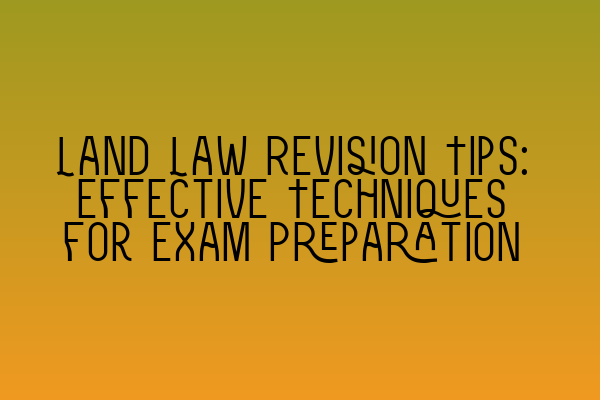Land Law Revision Tips: Effective Techniques for Exam Preparation
Introduction
Preparing for your Land Law exam can be a daunting task, but with the right techniques and strategies, you can ensure success. In this article, we will provide you with effective tips and tricks to help you ace your Land Law exam. Whether you are a student or a professional looking to refresh your knowledge, these revision tips will guide you through the intricacies of Land Law. So, let’s dive in!
1. Understand the Fundamentals
Before diving into the complexities of Land Law, it is essential to have a solid understanding of the basics. Familiarize yourself with key terms, concepts, and principles such as freehold, leasehold, easements, and covenants. Understanding these fundamentals will provide you with a strong foundation to build upon.
2. Organize your Revision Material
Having well-organized revision material is crucial to efficient studying. Create a study plan and divide your topics into manageable sections. Utilize color-coded notes, mind maps, or flashcards to help you remember key points. By organizing your material, you can easily review and revise the necessary information.
3. Practice with Past Papers
One of the most effective ways to prepare for your exam is by practicing with past papers. Familiarize yourself with the exam format and style of questions. This practice will help you identify any knowledge gaps and improve your time management skills. Additionally, it is beneficial to review the model answers to understand the structure and depth of analysis required.
4. Seek Clarification
If you come across any concepts or principles that you find difficult to grasp, don’t hesitate to seek clarification. Reach out to your tutors, attend revision classes, or join study groups to discuss challenging topics. Understanding the nuances of Land Law is crucial to answering exam questions accurately.
5. Create Revision Summaries
Create concise summaries for each topic to streamline your revision. Summarize key cases, statutes, and principles in bullet points or diagrams. These summaries will serve as quick references during your exam preparation and enable you to revise efficiently.
6. Utilize Mnemonics and Acronyms
To memorize complex legal concepts and principles, consider using mnemonics or acronyms. These memory aids can help you recall information quickly during the exam. For example, when remembering the elements of adverse possession, create a mnemonic like “OCEAN” (Open, Continuous, Exclusive, Adverse, Notorious).
7. Test Yourself Regularly
Periodically test yourself using flashcards or online quizzes to assess your knowledge. Utilize the Interactive SQE Mock Tests for Contract Law as a tool to test your understanding of Land Law concepts. Regular testing will reinforce your learning and help you identify areas that need further attention.
8. Stay Updated with Case Law
Land Law is constantly evolving with new cases shaping the interpretation of legal principles. Stay updated with the latest case law by following legal blogs, journals, or attending webinars. Understanding the current legal landscape will enhance your exam answers and demonstrate a deeper understanding of Land Law.
9. Review Critically
When reviewing your revision material, approach it critically. Evaluate the strengths and weaknesses of arguments and consider alternative viewpoints. Developing a critical mindset will help you demonstrate a comprehensive understanding of Land Law principles and enhance your exam performance.
10. Stay Calm and Confident
Finally, remember to stay calm and confident during your Land Law exam. Start your revision early, take regular breaks, and maintain a positive mindset. Confidence in your abilities will allow you to approach the exam with clarity and composure, leading to better results.
Conclusion
Preparing for your Land Law exam requires a systematic approach and dedication. By understanding the fundamentals, organizing your revision material, practicing with past papers, seeking clarification, and using revision summaries, mnemonics, and acronyms, you can optimize your exam preparation. Additionally, regularly testing yourself, staying updated with case law, reviewing critically, and maintaining a calm and confident mindset will contribute to your success. Good luck with your revision, and we hope these tips will help you achieve excellent results on your Land Law exam!
Related Articles:
– Understanding Contractual Capacity: Rights and Limitations
– Interactive SQE Mock Tests for Contract Law: Test Your Knowledge
– Join Our SQE Contract Law Webinars: Expert Insights and Guidance
– Contract Law Reforms: An Analysis of Recent Changes
– Parties in a Contract: Rights and Responsibilities
